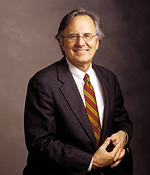New Dean Envisions Bold Future for Graduate School

Peter W. Cookson and his wife, Susan Stern Cookson, are both painters. Prominently displayed in his office are portraits, painted by Susan, of Albert Einstein, James Joyce, and Vincent Van Gogh—each a legend in his own field. Alongside these portraits, Peter has hung one of his own works: a brown, laced-up boot with a yellow daffodil springing out of the top. At first glance, this small, humble painting may seem out of place; however, after spending time with Cookson, you come to feel that it somehow represents his passion for thinking creatively, overcoming real and perceived boundaries, and transforming potential into fact.
Cookson accepted the position of dean and professor of educational administration at Lewis & Clark’s Graduate School of Education in June 2003. “Over the course of the nationwide search to fill the position, Peter impressed all of us,” says Jane Atkinson, vice president and provost of the College, who also served as interim dean of the graduate school from summer 2002 until Cookson’s arrival. “Beneath his congenial, easygoing manner is a single-minded determination to realize his bold and challenging vision for the graduate school.”
Prior to his appointment as dean, Cookson was president of the Doris Dillon Center and Teachers College Innovations at Columbia University’s Teachers College. In that position, he led a team that established national outreach programs using experiential and problem-based pedagogy. Also at Columbia, he started the Center for Education Outreach and Innovation and served as an associate professor in the department of organization and leadership.
Cookson’s scholarly work centers on applying sociological insights to educational challenges. His areas of interest include educational inequality, the sociology of education, research methods, and educational improvements. He has a national research reputation in the area of school choice and has written extensively on the subject, including a recent book about charter schools. He is currently writing a book about standardized testing.
Cookson says the decision to join Lewis & Clark was an easy one. “When I first visited the graduate school, I fell in love with the place,” he says. “It had a quality of life to it, a quality of spirit that felt unique and powerful. And since I’ve been here, that feeling has been reinforced by every experience I’ve had.”
He believes the principal strengths of the graduate school lie in its faculty, students, and alumni. “The faculty are highly gifted and teach with a sense of conviction that I haven’t seen at other places. And the students and alumni are superb,” he says. “I think the graduate school tends to be an unrecognized gem, both at Lewis & Clark College and in the Northwest generally.”
But Cookson, working in collaboration with the graduate school’s stakeholders, plans to lift up that gem for others to behold. In September, he formed an institution-wide task force composed of faculty, staff, and alumni and charged them to develop a blueprint for the graduate school’s growth over the next five years. The task force is addressing five key areas: schoolwide goals, department goals, administration, outreach initiatives, and fund-raising. The end product of this effort will be a published case statement that can serve as a guide for the graduate school’s outreach and fund-raising efforts.
“Basically, we’re turning the graduate school inside out,” says Cookson. “We’re going to retain the great things we’ve been doing and figure out ways to better express them in outward-facing activities.” Some ideas under discussion include the creation of a leadership and policy institute, a print and online professional journal, a research and development center devoted to shaping education and counseling curricula for the 21st century, and a nationally known writing center named for the late William Stafford, who was a poet laureate of Oregon and a beloved professor at Lewis & Clark. Cookson is also interested in creating an alumni council to provide advice, guidance, and intellectual support for the graduate school’s efforts.
Cookson’s vision is unabashedly bold. “I think we are poised to become the most innovative, daring, and successful graduate school of education in the nation,” he says. “It’s a creative opportunity for all of us.”
More L&C Magazine Stories
Lewis & Clark Magazine is located in McAfee on the Undergraduate Campus.
MSC: 19
email magazine@lclark.edu
voice 503-768-7970
fax 503-768-7969
The L&C Magazine staff welcomes letters and emails from readers about topics covered in the magazine. Correspondence must include your name and location and may be edited.
Lewis & Clark Magazine
Lewis & Clark
615 S. Palatine Hill Road MSC 19
Portland OR 97219

